 |
|||||||||




 |
|||||||||




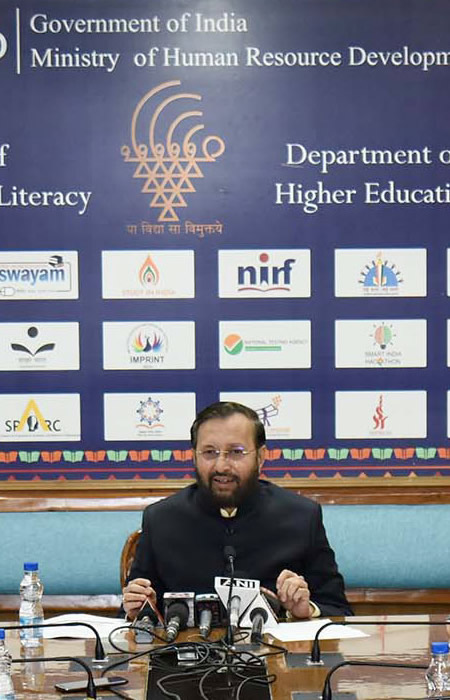
Photo: India’s Human Resource Development Minister is addressing a press conference in New Delhi. (File Photo)
New Delhi, January 28, 2019 — India’s Ministry of Human Resource Development has issued orders on the revision of allowances and special allowances for Teachers, Registrars, Finance Officers, and Controllers of Examinations in Central Universities and Colleges. The rules come into force with immediate effect.
The revised special allowance per month for Vice Chancellor, Pro-Vice Chancellor, Principal in PG College and Principal in UG College is Rs. 11,250/-, Rs. 9,000/-, Rs. 6,750/- & Rs. 4,500/- respectively.
This order would benefit 30000 teaching and equivalent staff in Central Universities and 5500 in Deemed to be Universities and will serve as a benchmark for 7 lakh teachers and staff in State Universities.
Source: Ministry of Human Resource Development, New Delhi
|GlobalGiants.Com|
The much awaited orders on revision of allowances & special allowances as per the 7th CPC for teachers & equivalent academic cadre, Registrars, Finance Officers and Controller of Examinations in Central Universities and Colleges thereunder have been issued.@PMOIndia @PIB_India
— Prakash Javadekar (@PrakashJavdekar) January 29, 2019
The orders come into force with immediate effect. The revised special allowance per month for Vice Chancellor, Pro-Vice Chancellor, Principal in PG College and Principal in UG College are Rs. 11,250/-, Rs. 9,000/-, Rs. 6,750/- & Rs. 4,500/- respectively. @PIB_India @PMOIndia
— Prakash Javadekar (@PrakashJavdekar) January 29, 2019
This is likely to benefit 30000 teaching and equivalent staff in Central Universities and 5500 in Deemed to be Universities.
— Prakash Javadekar (@PrakashJavdekar) January 29, 2019
This will serve as a bench mark for 7 lakh teachers in State Universities. @PMOIndia @PIB_India @PIBHindi
Edited & Posted by the Editor | 12:01 PM | View the original post
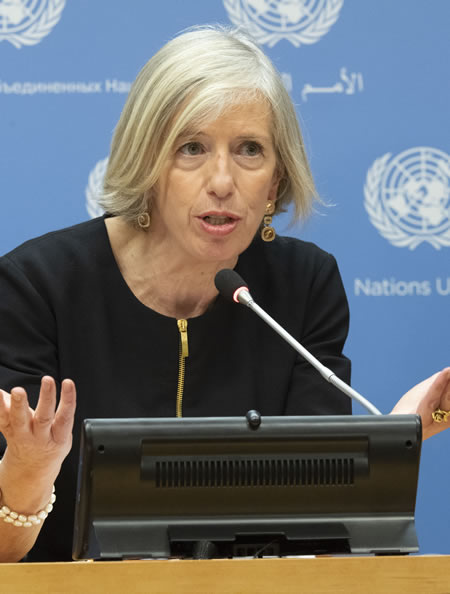
Photo: Stefania Giannini, Assistant Director-General for Education for the United Nations Educational, Scientific and Cultural Organization (UNESCO), briefs press on the occasion of the International Day of Education (24 January), in recognition of the role of education for peace and sustainable development. 24 January 2019. United Nations, New York. UN Photo/Evan Schneider.
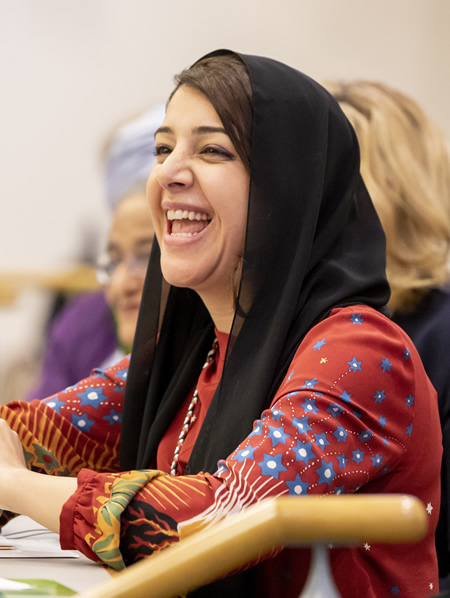
Photo: A participant speaks at the event “Making Impossible Possible: Unlocking Human Potential through the International Finance Facility for Education.” 24 September 2018. United Nations, New York. UN Photo/Laura Jarriel. (File Photo)
New York, 24 January 2019 — The United Nations observed the first International Day of Education to emphasize the action required to achieve the global education goals and targets in line with the 2030 Agenda for Sustainable Development. The celebration raised awareness of the crucial role of quality and relevant education for peace and development worldwide, including its contribution to poverty eradication, environmental sustainability and building peaceful and resilient societies. The event brought together the voices of governments, the UN system, private sector, civil society, faith-based organizations, teachers, academia and youth, united in their call to make education a leading global priority.
Recently, the United Nations General Assembly had proclaimed 24 January as International Day of Education in celebration of the role of education for peace and development.
Education is a human right, a public good, and a civic responsibility.
Source: UNESCO, Paris
|GlobalGiants.Com|
We're excited to celebrate the first International Day of Education! It's a day to recognize the importance of education for peace and development, and promote inclusive, equitable and quality education for all. Won't you join us? #EducationDay pic.twitter.com/laHYcybJVV
— Microsoft Education (@MicrosoftEDU) January 24, 2019
Education transforms lives and is at the heart of our mission to build peace, eradicate poverty & drive sustainable development.
— UNESCO (@UNESCO) January 24, 2019
🌠https://t.co/HDZzQTaRlN #EducationDay pic.twitter.com/JvZhNCuHPK
Edited & Posted by the Editor | 11:06 AM | View the original post
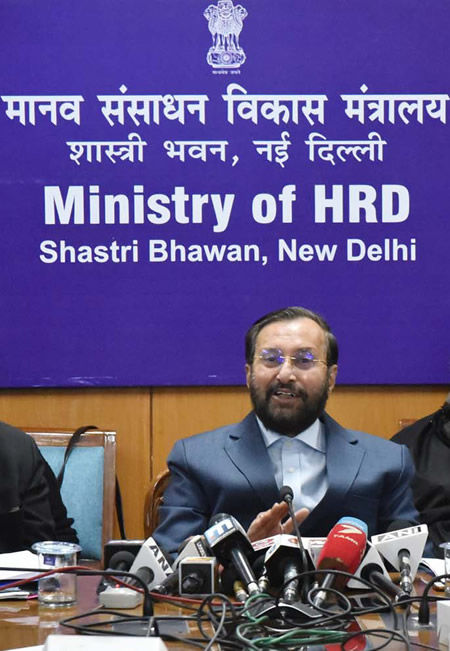
Photo: India’s Minister for Human Resource Development, Mr. Prakash Javadekar.
New Delhi, January 24, 2019 — The National Institute of Educational Planning and Administration (NIEPA) is organizing a two-day Workshop on Leadership Development in Higher Education for Vice-Chancellors from 24th January to 25th January 2019 in New Delhi. Union Minister for Human Resource Development, Prakash Javadekar, inaugurated the workshop. The workshop will focus on strategies to improve quality education through the sharing of ideas, experiences, case studies, and action plans at institutional and national levels. It will have a particular focus on the role of Academic Leaders in creating incentive system and capacity development of teachers and nurturing a work environment in institutions of higher education.
While addressing the Vice Chancellors, the Minister said that the country has put tremendous faith in us. To meet the expectations, we must have the vision to shape the future of higher education and facilitate institutional transformation. He said our future action plan should focus on improving quality education, developing infrastructure, promoting research environment, and increasing use of technology to take our institutions to the next higher level.
The Minister advised all the Vice Chancellors that as the leaders of their institutions, they must involve all the stakeholders — teachers, administration and students — in any decision making process. He stressed upon the need for the teachers to build a bond with the students to ensure their all-round development. Mr. Javadekar said that there is a need to deliberate upon ways to strengthen the faculty and enhance their competency in dealing with the changed social and technological context of teaching and learning. We need to understand the ways of developing teaching and research skills along with curriculum planning and assessment practices. He said Vice Chancellors should, through this workshop, share their rich experiences and ethical practices.
Source: Ministry of Human Resource Development, New Delhi
|GlobalGiants.Com|
Edited & Posted by the Editor | 1:28 PM | View the original post
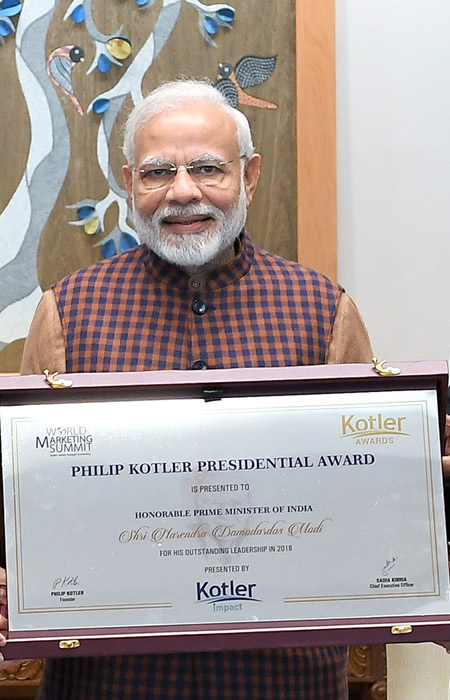
Photo: Prime Minister Narendra Modi with the first-ever Philip Kotler Presidential Award in New Delhi on January 14, 2019.
New Delhi, January 14, 2019 — The Prime Minister of India, Narendra Modi, today received the first-ever Philip Kotler Presidential Award in New Delhi.
Prof. Philip Kotler is a world-renowned Professor of Marketing at Kellogg School of Management, Northwestern University, USA.
The Award focuses on the triple-bottom-line of People, Profit, and Planet. It will be offered annually to the leader of a Nation.
The Award Citation says:
“Shri Narendra Modi is selected for his outstanding leadership for the nation. His selfless service towards India, combined with his tireless energy has resulted in extraordinary economic, social and technological advances in the country.”
The Citation adds: “Under his leadership, India is now identified as the Centre for Innovation and Value Added Manufacturing (Make in India), as well as a global hub for professional services such as Information Technology, Accounting, and Finance.”
The Citation also mentions: “His visionary leadership has also resulted in the Digital Revolution (Digital India), including the Unique Identification Number, Aadhaar, for social benefits and financial inclusion. It is enabling entrepreneurship, ease of doing business, and creating a 21st-century infrastructure for India.”
The Citation mentions initiatives such as Make in India, Startup India, Digital India, and Swachh Bharat, which, according to it, “have positioned India as one of the most lucrative manufacturing and business destinations in the world.”
Source: Prime Minister’s Office, New Delhi
|GlobalGiants.Com|
Edited & Posted by the Editor | 1:48 PM | View the original post
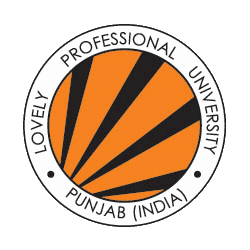
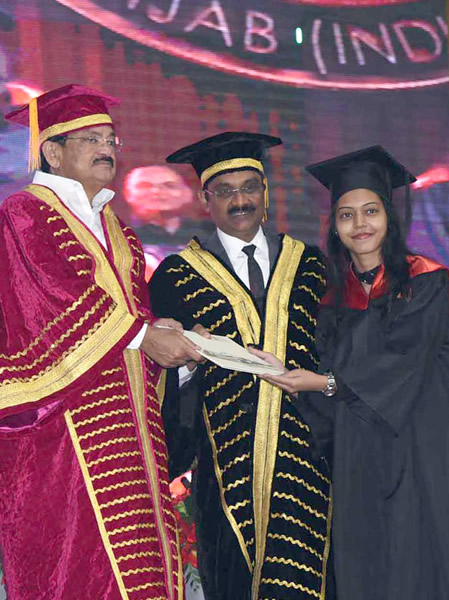
Photo: The Vice President of India, M. Venkaiah Naidu, presenting degrees & certificates to the students and researchers, at the 9th Convocation of Lovely Professional University, at Phagwara, Jalandhar, Punjab on October 22, 2018.
One of the world’s largest science meets, Indian Science Congress (ISC)-2019, is going to be held from 3rd to 7th January 2019, at Lovely Professional University in Jalandhar, Punjab. Prime Minister Narendra Modi will inaugurate it on 3rd January. PM Modi will also address about 30,000 delegates including many Nobel Laureates, Union Cabinet Ministers of India, science policymakers, administrators, eminent scientists, young men-women researchers and school children from across India & abroad.
During the five days long congress, around 100 plus conferences and events of scientific and technology origin will be held, where eminent personalities from India government organizations like DRDO, ISRO, DST, AIIMS, UGC, AICTE, and many elite universities of the USA, UK, India, and other countries will participate. Union Cabinet ministers including Science and Technology Minister, Dr. Harsh Vardhan, and Textile Minister, Smriti Irani, will also attend the event.
The event will play a pivotal role in stimulating scientific research effort and raising the scientific temperament in the country and the world. The Nobel Laureates who will be participating include German-American biochemist, Prof. Thomas Sudoph, who has been awarded the 2013 Nobel Prize in Physiology and Medicine; Hungarian-born Israeli biochemist and Nobel laureate in Chemistry, Prof. Avram Hershko; and British born physicist, Frederick Duncan Michael Haldane, who has been awarded 2016 Nobel Prize in Physics.
General President of the Indian Science Congress Association, Dr. Manoj Kumar Chakrabarti, believes that 106th session of ISC will be a milestone for the future development of India since it is going to provide a great platform for exchanging ideas and innovations among young minds. Mr. Ashok Mittal, Chancellor of Lovely Professional University, which is hosting the five-day long event, expressed his happiness on organizing one of the leading scientific activities of the world. “Our engineering students have designed a special ‘Solar powered Multi-Seated Driver-Less Bus.’ This bus will ferry PM Modi to the ISC venue,” Mr. Mittal added
To be inaugurated on the 2nd day of ISC, 4th January 2019, Children’s Science Congress will target 10-17 year children for carrying forward innovation and research in science to a next level. Near 150 science projects are to be showcased, and children will also have the opportunity to listen and interact with eminent scientists and Nobel Laureates.
On the third day of ISC, two-day Science Communicators’ Meet- 2019 will be inaugurated, where the main aim will be to brainstorm ways of dissemination of scientific information and inculcation of scientific attitude among masses. Various Journalists from top media-houses would also be a part of the communicators’ meet.
With its inauguration on 5th January, ‘Women’s Science Congress’ will showcase the contribution of women in Science, Technology and the Society. Here, renowned women scientists and leaders from Government, academia, and industry will deliver lectures and participate in panel discussions on promoting talent among women.
Also, there would be 14 Plenary Sessions. Science and technology stalwarts would chair them.
Source: Ministry of Science & Technology, Government of India
|GlobalGiants.Com|
Edited & Posted by the Editor | 5:40 AM | View the original post
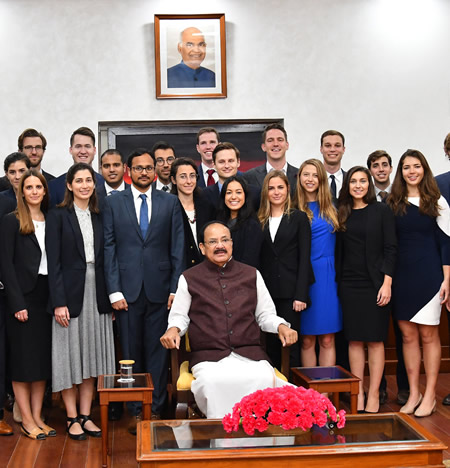
Photo: The Vice President of India, M. Venkaiah Naidu, with the Students from Stanford Graduate School of Business, in New Delhi on December 18, 2018.
Source: Vice President’s Secretariat
|GlobalGiants.Com|
Edited & Posted by the Editor | 10:33 AM | View the original post
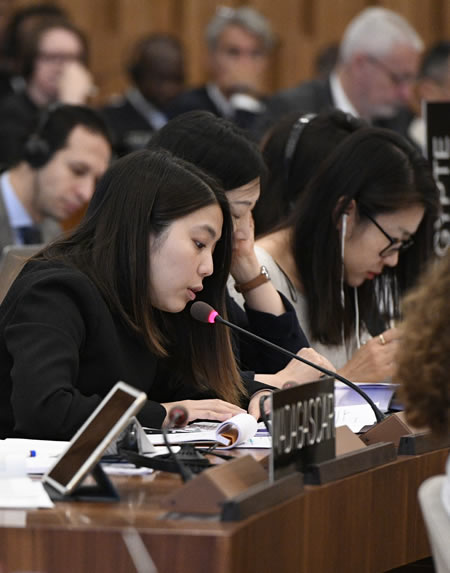
Photo: A scene from a meeting of the Preparatory Group of the UNESCO Executive Board, UNESCO Headquarters, Paris, France. Image provided by and copyright © UNESCO/Cyril Bailleul. [File Photo]
New Delhi, December 12, 2018 — The UNESCO Office in New Delhi in collaboration with Participatory Research in Asia (PRIA), hosted the first-ever Consultation of UNESCO Chairs, from 10-11 December 2018 in New Delhi. The primary objective of the consultation was to build a more informed and active network of UNESCO Chairs in India and to brainstorm and share ideas on the role of UNESCO Chairs in strengthening the work of UNESCO. The two-day consultation saw the participation by all 11 UNESCO Chairs in India.
On Day 1, the UNESCO New Delhi Director, Eric Falt, welcomed all the participants at UNESCO House, which was followed by the screening of a Film on UNESCO’s 70 years in India. The reception at the UNESCO House was a unique opportunity for all the 11 Chairs present to introduce themselves and to build meaningful networking in an informal setting.
On the second day, the meeting started with an address by Dr. Rajesh Tandon who warmly welcomed all the UNESCO Chairs in India to PRIA campus. UNESCO New Delhi Director, Eric Falt made a presentation highlighting critical activities undertaken by the different sectors in the New Delhi Office. Dr. N. Saravana Kumar, Joint Secretary (ICC), Ministry of Human Resource Development (MHRD) thanked UNESCO for organizing the meeting and highlighted the need to engage meaningfully with the UNESCO Chairs in strengthening the programmes and policies of MHRD.
During the work session, the Chairs brainstormed about enhanced collaboration with UNESCO New Delhi and how they could further UNESCO’s agenda in their respective areas of specialization. The members presented key ideas which included reinforcing the network of UNESCO Chairs by setting up e-groups for enhanced networking and knowledge sharing and promoting core values of UNESCO through their ongoing courses and programmes.
The UNITWIN/UNESCO Chairs Programme consists of the establishment of UNESCO Chairs and UNITWIN (University Twinning and Networking) Networks in higher education institutions. Because of the nature and flexibility of the UNITWIN/UNESCO Chairs Programme, universities can respond more readily and with greater autonomy to the demands for new learning and research in a world undergoing rapid economic, social and technological change. India has established 11 Chairs on different subjects.
Following is the List of Chairs under the UNITWIN/UNESCO Programme —
Sources: UNESCO India Office, New Delhi; Indian National Commission for Co-operation with UNESCO
|GlobalGiants.Com|
Edited & Posted by the Editor | 2:42 PM | View the original post
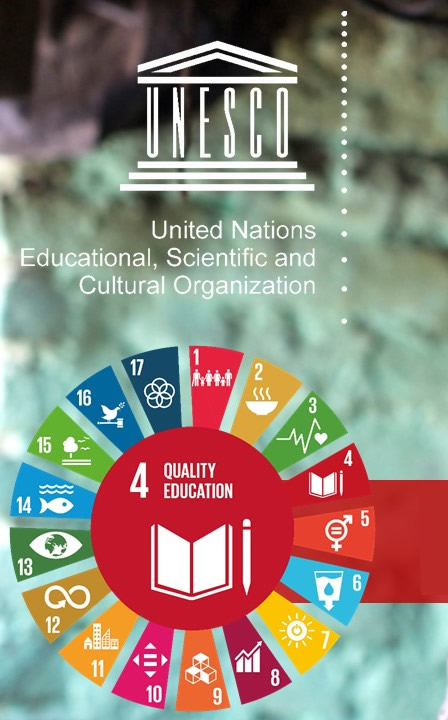
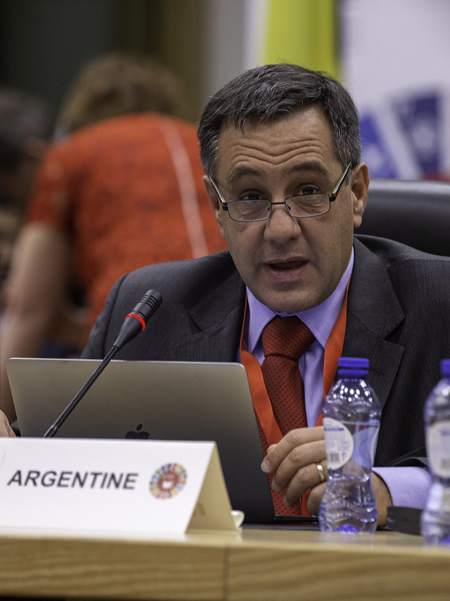
Photo: Global Education Meeting. December 5, 2018. Brussels, Belgium. Image provided by & copyright © UNESCO / G Chekaiban.
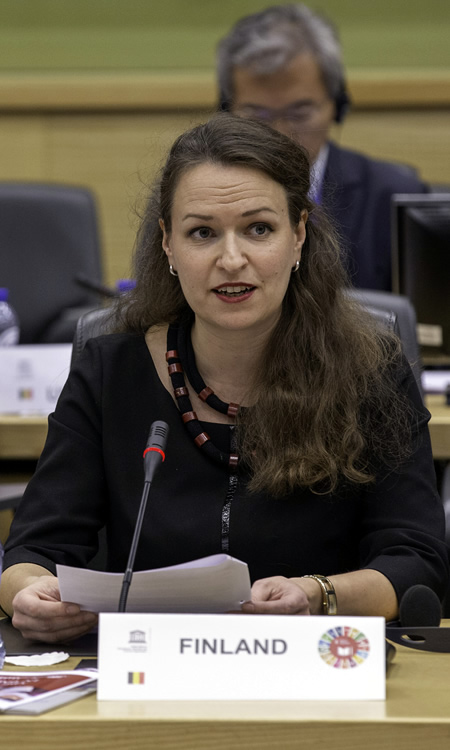
Photo: Global Education Meeting. December 5, 2018. Brussels, Belgium. Image provided by & copyright © UNESCO / G Chekaiban.
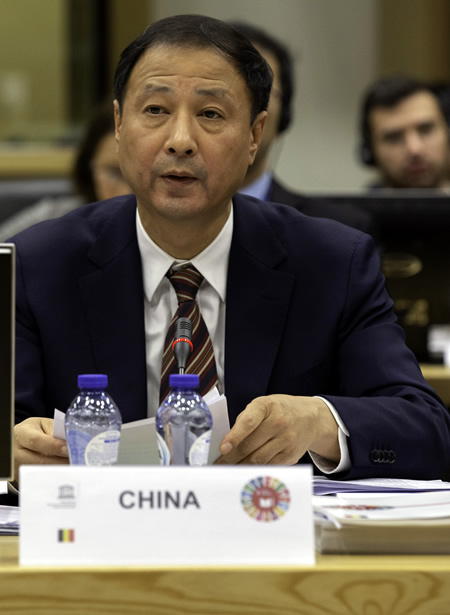
Photo: Global Education Meeting. December 5, 2018. Brussels, Belgium. Image provided by & copyright © UNESCO / G Chekaiban.
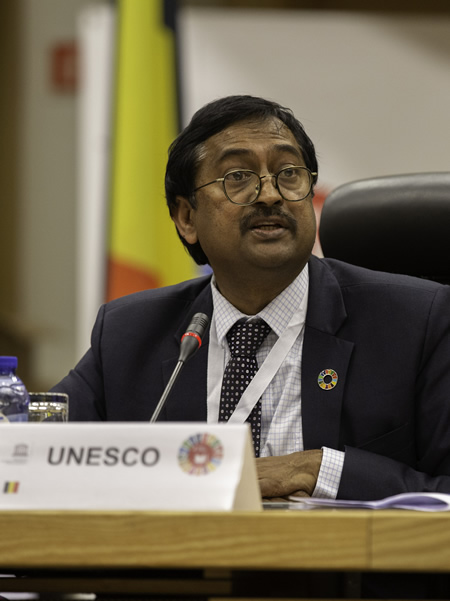
Photo: Global Education Meeting. December 5, 2018. Brussels, Belgium. Image provided by & copyright © UNESCO / G Chekaiban.
Brussels, Belgium, December 6, 2018 — UNESCO convened the Global Education Meeting in Brussels, from 3 to 5 December 2018, to agree on common next steps for education. Stefania Gianini, Assistant-Director General for Education at UNESCO called for “strong political will, sustained collective action and a massive increase of resources.”
UNESCO brought together Ministers, representatives of Member States, multilateral organizations, civil society, the teaching profession, youth, and the private sector. Gianini sought consensus on building an education partnership platform engaging the gamut of development partners across industries. She highlighted the complementary roles and the strengths of partners around the table to keep education on top of the political and private sector agenda.
United Nations Special Advocate for the Sustainable Development Goals, Queen Mathilde of Belgium, and UNESCO Special Envoy on Literacy for Development, Princess Laurentien of the Netherlands, called for partnerships with non-educational players and the private sector. Princess Laurentien urged development partners to make education relevant to other industries and emphasize the shared responsibility of the 2030 Sustainable Development Agenda, adopted by the United Nations in 2015.
UNESCO announced that the WIDE (World Inequality Database on Education) platform would be further developed through the Global Education Monitoring Report and UNESCO Institute of Statistics to understand better inequalities within countries in ensuring access to education, participation, completion, and learning outcomes.
Countries, regional partners, and development agencies adopted the outcome statement - the Brussels Declaration with the following key points:
Although the Global Education Meeting only takes place every four years, partners would work on a continual basis, on the harmonization and strengthening of support to Member States and partners to achieve the education-related targets of the global agenda. This work would be carried out through the UNESCO led SDG-Education 2030 Steering Committee, the global multi-stakeholder mechanism for education in the 2030 Agenda.
Gianini closed the Meeting saying, “2019 is the year of education. We have an opportunity that we cannot and must not waste. Beginning with the new International Day of Education on 24 January, to the High-Level Political Forum and G7 in July, to the UNGA 2019, and the UNESCO General Conference in November. It is a time for action”.
Source: UNESCO, Paris & Brussels
|GlobalGiants.Com|
#UNESCO Global Education Meeting. Ministerial Segment. December 4, 2018. Brussels, Belgium. https://t.co/74MMHpfic3
— GlobalGiants.Com (@GlobalGiants) December 6, 2018
#UNESCO Global Education Meeting. Ministerial Segment. December 5, 2018. Brussels, Belgium. https://t.co/ARSsZid5Xq
— GlobalGiants.Com (@GlobalGiants) December 6, 2018
Edited & Posted by the Editor | 5:19 AM | View the original post
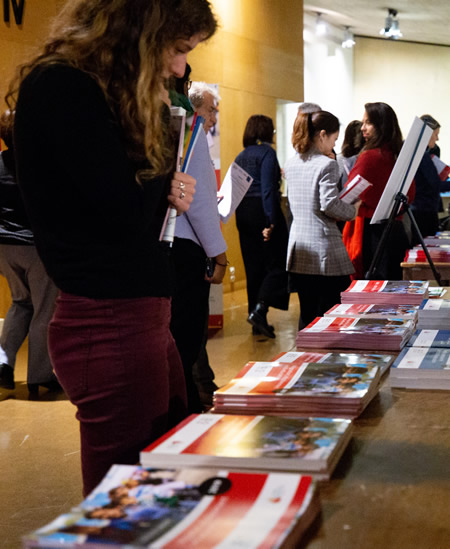
Photo: Launch of the 2019 Global Education Monitoring Report. November 26, 2018. UNESCO Headquarters, Paris. Image provided by and Copyright © UNESCO/Christelle ALIX.
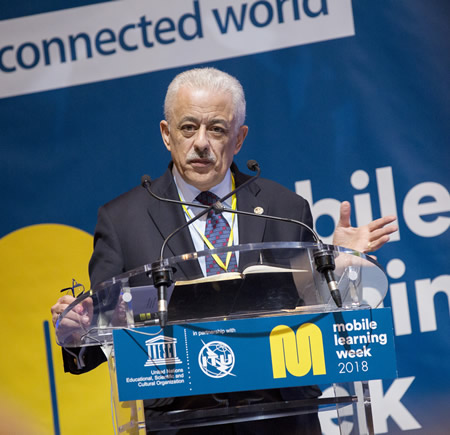
Photo: Mobile Learning Week. March 2018. UNESCO Headquarters, Paris. Image provided by and Copyright © UNESCO/Christelle ALIX. File Photo.
Paris, France, 23 November 2018 — Some 350 ministers, officials, representatives of development agencies and other partners from all over the world will take stock of progress in meeting the educational objectives of the United Nations 2030 Sustainable Development Agenda during the Global Education conference, 3 to 5 December, in Brussels, Belgium.
In its mandated role as lead agency and coordinator of the Education 2030 Agenda, UNESCO has convened the Global Meeting with the support of the Government of Belgium.
It is the first Global Education Meeting since the adoption of the Sustainable Development Agenda in 2015. The meeting would focus on the need to reduce inequalities in education. It will also examine the links between education and the Sustainable Development Goals on Decent Work, Economic Growth, Reduced Inequalities, Climate Action, Peace, Justice, and Strong Institutions.
Organized by UNESCO in consultation with the SDG-Education 2030 Steering Committee, and hosted by the government of Belgium, the meeting will address urgent priorities in a world that still numbers 262 million out-of-school children, adolescents, and youth. The data also show that 617 million children and adolescents — i.e., six out of ten — are unable to read a simple sentence or handle necessary mathematic calculations.
Queen Mathilde of Belgium will officially open the meeting (4 December, 2 PM) alongside Stefania Giannini, UNESCO’s Assistant Director-General for Education, Ambassador Inga Rhonda King, President of UN ECOSOC, and Tibor Navracsics, European Commissioner for Education, Culture, Youth and Sports. Amina J. Mohammed, UN Deputy Secretary-General will deliver the keynote address.
Source: UNESCO, Paris
|GlobalGiants.Com|
Edited & Posted by the Editor | 5:21 AM | View the original post
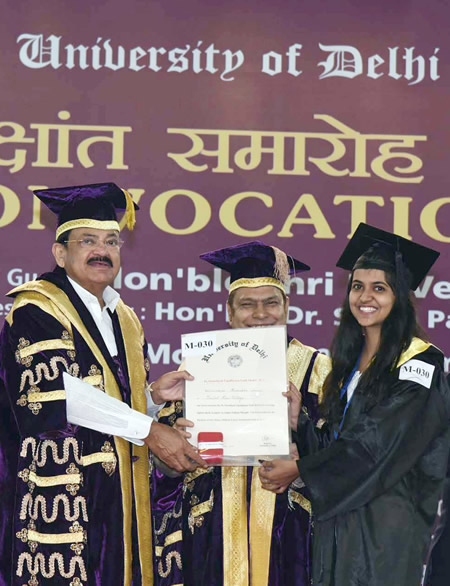
Photo: The Vice President of India, M. Venkaiah Naidu, presenting the Degrees and Medals to the Students at the 95th Annual Convocation of the University of Delhi, in Delhi on November 19, 2018.
New Delhi, November 19, 2018 — “You have been lucky enough to gain education from this great university. However, on this day, spare a thought to those young people who did not get such an opportunity in spite of deserving it. It is up to us to take the benefits of education and the opportunities it opens up to the last mile, to the last person,” the Vice President of India, M. Venkaiah Naidu, told the graduating students of the University of Delhi. He was addressing the 95th Annual Convocation of the University of Delhi, here today.
The Vice President congratulated the University and said that that the vision and mission of the University truly reflected its long-term commitment to nation-building and steadfast adherence to universal human values. He added that the motto of the University, ‘Nishtha Dhriti Satyam,’ Dedication, Steadfastness, and Truth justly reflected its ideals. Congratulating all the graduating students and prize winners, especially the young women, the Vice President appreciated the University’s focus on women’s education.
The Minister of State for Human Resource Development, Satyapal Singh, the Vice Chancellor of the University, Prof. Yogesh Tyagi, students, faculty and staff of Delhi University, and parents were present at the ceremony.
Source: Vice President’s Secretariat, New Delhi.
|GlobalGiants.Com|
Edited & Posted by the Editor | 1:08 PM | View the original post
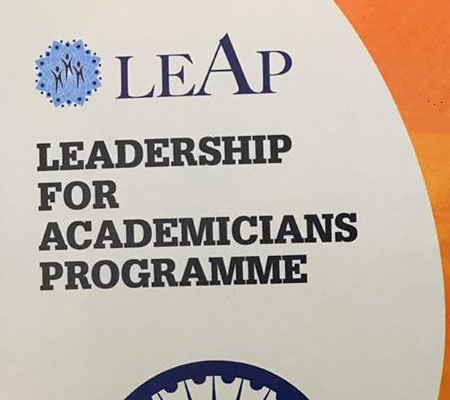
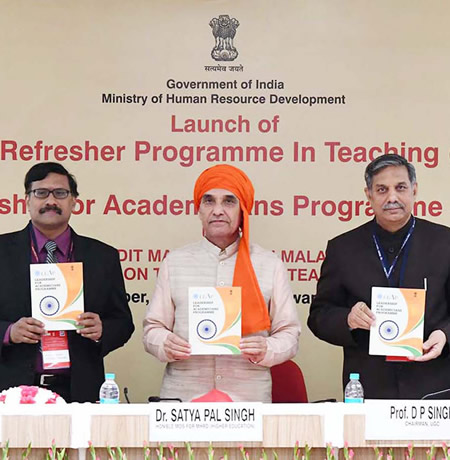
Photo: The Secretary, Department of Higher Education, R. Subrahmanyam, the Minister of State for Human Resource Development, Dr. Satya Pal Singh, and the Chairman of the University Grants Commission (UGC), Prof D P Singh, launching the Leadership for Academicians Programme (LEAP), in New Delhi on November 13, 2018.
New Delhi, November 13, 2018 — Dr. Satya Pal Singh, Minister of State, Ministry of Human Resource Development, launched a new initiative, Leadership for Academicians Programme (LEAP) today at New Delhi. He also released an information brochure of the action. “Combining the qualities of a good teacher and an effective leader is a daunting but not an impossible task. LEAP will fulfill this critical need,” the Minister said.
Prakash Javadekar, Union Minister of Human Resource Development, in his video message lauded the initiative, which, he said, is set to transform the quality of teaching and improve leaders, thereby enhancing the quality of higher education institutions.
The Secretary, Higher Education, the Chairman, University Grants Commission (UGC), Vice-Chancellors, Directors, heads of autonomous bodies, and representatives of LEAP training institutions, attended the launch.
R. Subrahmanyam, Secretary, Higher Education, stated that this initiative is hugely significant as it will create transformative teachers and leaders.
Leadership for Academicians Programme (LEAP) is a three weeks Flagship leadership development training programme (2 weeks domestic and one-week foreign training) for second level academic functionaries in publicly funded higher education institutions. The primary objective is to prepare second-tier academic heads who are potentially likely to assume leadership roles in the future. The programme would provide senior faculty, with high academic credentials, the necessary leadership and managerial skills including skills of problem-solving, handling stress, team building work, conflict management, developing communication skills, understanding and coping with the complexity and challenges of governance in HEIs, financial & general administration.
• In short, this Leadership Development Program aims to equip second level functionaries in Public Funded Institutions such as Deans, Heads of Departments, and Directors of Divisions/Schools with the leadership skills necessary for governance roles in higher education institutions.
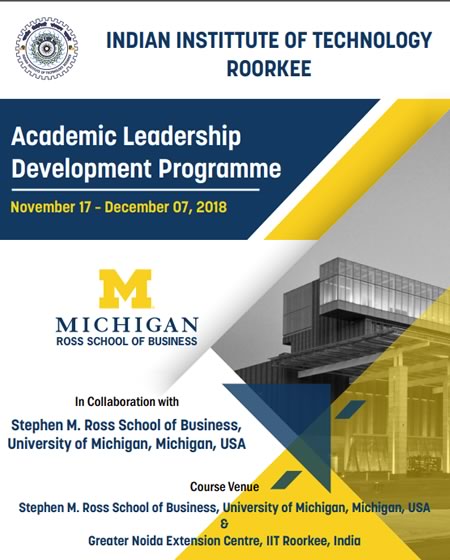
Photo: Brochure of IIT Roorkee conducting the programme in collaboration with the University of Michigan.
The implementation of the LEAP Programme will be through the following 15 select Indian Institutions:
The Government of India has identified the leading foreign Universities for the training. The international collaborating institutions are:
Prof D. P. Singh, Chairman, University Grants Commission (UGC), has urged all Vice-Chancellors and Directors to encourage their eligible faculty across all disciplines to register and complete this refresher course.
Source: Ministry of Human Resource Development, New Delhi
|GlobalGiants.Com|
Edited & Posted by the Editor | 2:21 PM | View the original post
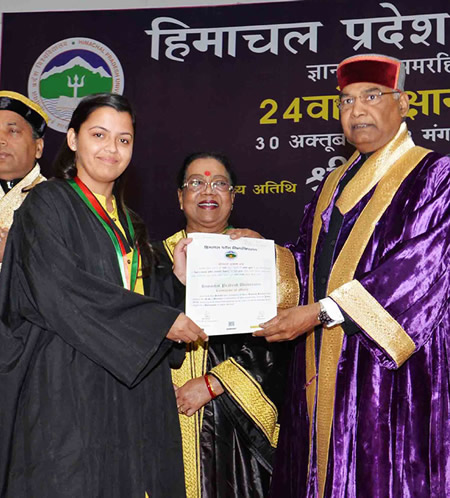
Photo: The President of India, Ram Nath Kovind, presenting the degree to a student at the 24th Convocation of Himachal Pradesh University, at Shimla, in Himachal Pradesh, India, on October 30, 2018.
Source: President’s Secretariat, New Delhi.
|GlobalGiants.Com|
Edited & Posted by the Editor | 3:44 PM | View the original post

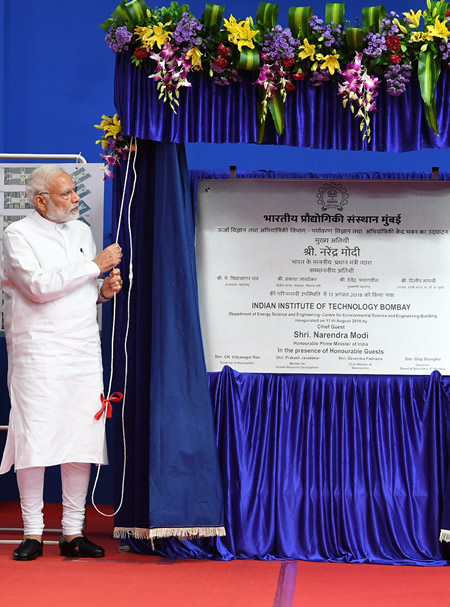
Photo: The Prime Minister of India, Narendra Modi, inaugurates the new building of the Department of Energy Science & Engineering and Centre for Environmental Science and Engineering, at IIT Bombay, in Mumbai on August 11, 2018. [File Photo]
London, October 24, 2018 — QS Quacquarelli Symonds has released the rankings of Asia’s 500 best universities. The National University of Singapore takes back the leadership of the Asia ranking from Nanyang Technological University, and the University of Hong Kong moves three places to second. However, it is Mainland China’s universities that have made the most significant impact with five in the top 20 - two more than last year - all improving their position. Japan is the second most represented country, followed by India and South Korea.
Number of ranked universities by location
QS Asia University Rankings 2019 — Top 10
The 2019 list features over 400 universities from 17 countries in Asia and adopts a methodology that consists of 11 indicators:
QS Asia University Rankings 2019 — INDIA
QS RANK — INSTITUTION
Led by Indian Institute of Technology Bombay (IIT Bombay), India has eight universities among the top 100 universities in Asia. IIT Bombay is ranked 33 followed by IIT Delhi (40), IIT Madras (48) and Indian Institute of Science Bangalore (50).
QS Asia University Rankings 2019 — PAKISTAN
QS RANK — INSTITUTION
Source: QS Quacquarelli Symonds
|GlobalGiants.Com|
It's heartening to know that @iitbombay, @iitdelhi, @iiscbangalore & @iitkharagpur have improved on their rankings from last yr in latest #QS Asia Rankings.
— Prakash Javadekar (@PrakashJavdekar) October 24, 2018
The @narendramodi govt will continuously encourage & support pursuit of excellence in higher education.#TransformingIndia
Edited & Posted by the Editor | 4:26 PM | View the original post
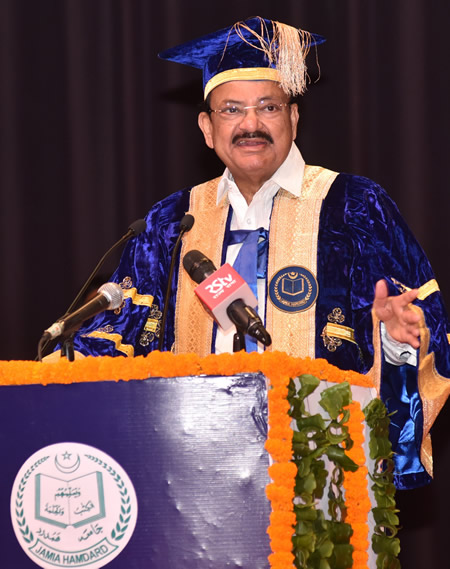
Photo: Vice President of India, M. Venkaiah Naidu, addresses the 13th convocation of Jamia Hamdard University, in New Delhi on October 23, 2018.
New Delhi, October 23, 2018 — The Vice President of India, M. Venkaiah Naidu, has said that girls’ education should be the center of women empowerment. Addressing the 13th convocation of Jamia Hamdard University, here today, he stressed the need to empower students, especially girls by providing skills, apart from academic excellence to compete in the global job market.
The Vice President appreciated the efforts of Jamia Hamdard Management and faculty for having almost 50% enrolment of female students in its Hamdard programs and said that educating girls of all sections of society is a vital factor in the overall development of the nation.
There is nothing more important than educating women - it is the one sure shot, a consistent gauge of progress for practically every development indicator, from mortality declines to economic growth, democracy, and justice, he said.
“Jamia Hamdard currently houses one of the pioneering colleges in the field of Nursing Education. I understand that there is a fierce competition happening to obtain a seat in the prestigious Rufaida College of Nursing at Jamia Hamdard. I appreciate that graduates and teachers of the Nursing College of Jamia Hamdard have won global recognition for their committed service,” Mr. Naidu stated.
Mr. Naidu told the students in the medical profession not to let technology and gadgets overtake people and relationships. “Always respond sensibly, sensitively, reservedly and mildly to people who come to you suffering from ailments of the mind, body, and spirit. Always be kind, for there is no virtue like kindness,” he advised.
“The world is now truly a global village, and you are all ready to take a global journey,” the Vice President said. “Each step you take in the right direction will make you, your family, and your nation proud. The University expects you to remain forever worthy of the degree that is being conferred upon you today, and become ambassadors of your alma mater.”
Source: Vice President’s Secretariat.
|GlobalGiants.Com|
It is my great honour to be a part of this prestigious institution’s 13th Convocation. Today, the graduating students who have been conferred degrees, shall join a large and prominent group of global alumni of Jamia Hamdard based all across the globe. #JamiaHamdard #convocation pic.twitter.com/5BilKcWna0
— VicePresidentOfIndia (@VPSecretariat) October 23, 2018
Edited & Posted by the Editor | 10:55 AM | View the original post
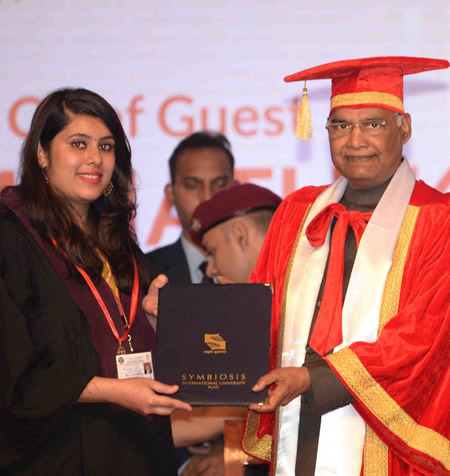
Photo: The President of India, Ram Nath Kovind, presenting the degrees to the students, at the 15th Convocation of the Symbiosis International University, at Pune, in Maharashtra on October 23, 2018.
The President of India, Ram Nath Kovind, graced and addressed the 15th convocation of the Symbiosis International University in Pune, today, October 23, 2018.
The President said that India had been a center of learning for centuries. From Taxila to Nalanda, the subcontinent’s age-old universities attracted students from different parts of Asia and beyond. In modern times as well our campuses have been open to and welcoming of talented young people from many countries, especially those in our neighborhood and Africa.
The President said that it is worth noting that 46,144 international students from 166 countries study in various colleges, universities, and institutions of higher learning in India. Symbiosis plays a significant role in this process. He was happy to note that over 1,000 international students study in Symbiosis. Of those who are graduating today, 329 students are from 33 countries other than India. He said that this adds to the multicultural and cosmopolitan atmosphere of Symbiosis’s campus, and promotes goodwill among nations.
Source: President’s Secretariat, New Delhi.
|GlobalGiants.Com|
#PresidentKovind addresses 15th convocation of Symbiosis International University in Pune; says India has a massive network of 903 universities and 39,050 colleges. The challenge is in attaining world-class excellence across the spectrum pic.twitter.com/vFsmQJ3ilH
— President of India (@rashtrapatibhvn) October 23, 2018
Edited & Posted by the Editor | 8:03 AM | View the original post
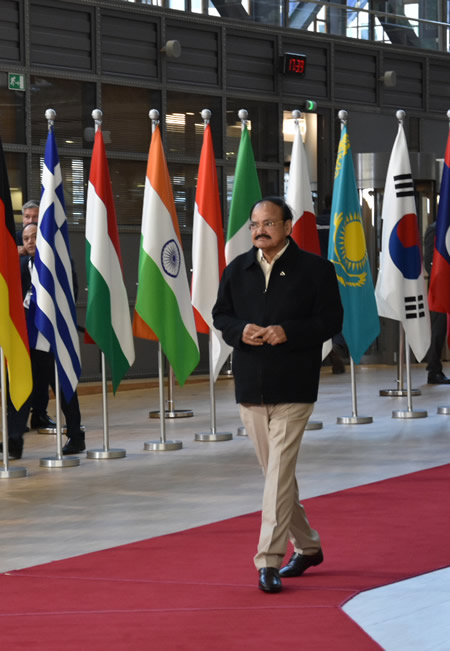
Photo: The Vice President of India, M. Venkaiah Naidu, arrives at the 12th Asia-Europe Meeting, at the Europa Building, in Brussels, Belgium on October 18, 2018. [File Photo]
Phagwara, Punjab, India. October 22, 2018 — The Vice President of India, M. Venkaiah Naidu, today exhorted universities and higher educational institutions in the private sector to earmark a certain percentage of seats for the weaker sections and subsidize their education.
Mr. Naidu was delivering the 9th Convocational Address of the Lovely Professional University at Phagwara, Punjab.
The Vice President pointed out that the public sector alone cannot provide quality higher education for all and the private sector must pitch in. He said that industries and the private sector, in general, should supplement the efforts of the government in making quality education available to all. “Our challenge is to ensure the spread of knowledge to every section and every corner of our country,” he added.
Calling for a complete overhaul of our education system, the Vice President said that majority of our colleges had become breeding centers for producing students with degree certificates rather than individuals with critical analytical skills.
“In the 2019 Times Higher Education’s global rankings, no Indian University has figured in the top 200 institutions. These rankings underscore the need for higher education institutions to improve the standards by leaps and bounds to make them globally competitive,” Mr. Naidu stated.
“Dear graduating students, today is an occasion to remember fondly for the rest of your lives. Strive to become independent thinkers and use your knowledge and competencies for the betterment of society for building a strong, modern and prosperous India,” Mr. Naidu said.
“I am quite happy to be in this beautiful and imposing campus of Lovely Professional University to participate in its Convocation. I want to congratulate LPU, a young university, for its enthusiasm to provide quality education and prepare students to face the challenges of the global society in the 21st century,” the Vice President concluded.
Source: Vice President’s Secretariat, New Delhi.
|GlobalGiants.Com|
I congratulate the Chancellor, faculty members and the staff of LPU for taking forward the cause of providing quality education to the masses and thereby contributing to nation-building. I also congratulate the graduating students and their proud parents. @lpuuniversity #LPU pic.twitter.com/Ps2P7xd7Ox
— VicePresidentOfIndia (@VPSecretariat) October 22, 2018
Edited & Posted by the Editor | 10:45 AM | View the original post
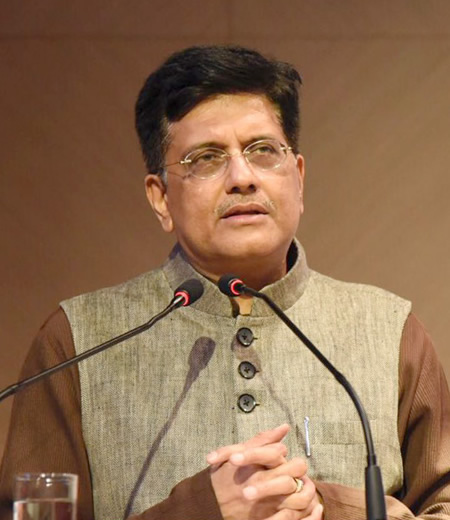
Photo: Piyush Goyal, Minister of Railways & Coal, Government of India.
PHILADELPHIA, October 19, 2018 — The Kleinman Center for Energy Policy at the University of Pennsylvania School of Design has awarded its fourth annual Carnot Prize to Piyush Goyal, Minister of Railways & Coal and former Minister of Power, Coal, New & Renewable Energy and Mines, Government of India. The award recognizes the pathbreaking transformations in India’s energy sector under the leadership of Prime Minister Narendra Modi.
The Carnot Prize is the Kleinman Center’s annual recognition of distinguished contributions to energy policy through scholarship or practice. The most prestigious award in the energy sector, Carnot Prize is named after French physicist Nicolas Sadi Carnot who recognized that the power of the steam engine would “produce a great revolution” in human development. The Carnot Prize is intended to honor those leading revolutions in energy policy to further progress and prosperity.
“We applaud the Honorable Minister Goyal for his courageous work in crafting policy capable of meeting the biggest challenges in energy,” said Frederick Steiner, dean and Paley Professor at PennDesign.
“It is a testament to the visionary leadership of Prime Minister Narendra Modi that this work energizing the lives of 1.3 billion Indians is being globally recognized with the Carnot Prize by the University of Pennsylvania,” said Goyal.
The International Energy Agency (IEA) reports that in the year 2000, less than half of India’s population had access to electricity. Now, more than 80 percent of the population has access to power. If this pace continues, India will have universal electrification by 2020, “one of the largest successes in the history of electrification.”
The Kleinman Center for Energy Policy operates within the School of Design at the University of Pennsylvania. Its mission is to create the conditions for policy innovation that support a just and efficient transition to sustainable energy.
The University of Pennsylvania is an Ivy League school.
Sources: University of Pennsylvania School of Design and Ministry of Railways, Government of India.
|GlobalGiants.Com|
Edited & Posted by the Editor | 8:10 AM | View the original post

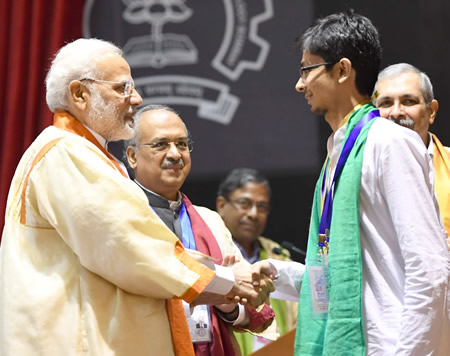
Photo: Prime Minister Narendra Modi presenting the awards at the Annual Convocation of the Indian Institute of Technology Bombay in August 2018. [File Photo]
LONDON, October 15, 2018 — QS Quacquarelli Symonds, the global higher education think tank responsible for the world’s most-consulted world university rankings, released their first standalone ranking of India’s higher education institutions.
The inaugural edition of the QS India University Rankings is designed to offer an independent analysis of the performance of Indian institutions. The rankings include Public Universities, Private Universities, and H.E. Institutions or Deemed Universities.
IIT Bombay is named India’s leading institution. IITs take up seven of the top-10 places. IIS Bangalore takes the second spot. Twenty Indian institutions receive full marks in the Staff with Ph.D., the indicator designed to identify the extent to which institutions are cultivating a highly-qualified faculty body. In the research productivity indicator, nine institutions achieve a score between 98.4 and 100.
IIT Bombay, Madras, Delhi, Kharagpur, Kanpur and the University of Delhi enjoy outstanding regard among the nearly 43,000 international employers surveyed, while IIT Bombay, IIT Delhi, and the IIS Bangalore were the most voted by 83,000+ international academics polled.
On a metric-by-metric basis, other institutions also stand out such as the Institute of Chemical Technology, Mumbai, which achieves the highest score of the QS’s indicator of research impact, adjusted for faculty size.
Ben Sowter, Research Director, QS, said: “This inaugural table evaluates the Indian institutions through independent and international lenses. The results reveal that research productivity at leading Indian institutions is increasing and the impact of such research is gradually rising. They also enjoy a good standing with employers while they achieve less recognition with their international academic peers, perhaps suggesting the need to intensify regional and global collaborations.”
Institutions have been scored on academic reputation (30 per cent), employer reputation (20 per cent), faculty-student ratio (20 per cent), proportion of staff with PhD (10 per cent), papers per faculty from Scopus database (10 per cent), citations per paper from Scopus database (5 per cent), proportion of international students (2.5 per cent) and proportion of international faculty (2.5 per cent).
QS India University Rankings 2019
………………………………………………………………….
SOURCE QS Quacquarelli Symonds
|GlobalGiants.Com|
Our premier institutions, @iitbombay, @iitmadras , @iitdelhi , @iitkharagpur , @IITKanpur & the University of Delhi enjoy outstanding regard among the 43,000 international employers surveyed @worlduniranking #QSRankings #TransofrmingIndia
— Prakash Javadekar (@PrakashJavdekar) October 16, 2018
WATCH: Meet India's top 10 universities for 2019! 📚 #QSWUR https://t.co/QtyQzs0N77
— QS World University Rankings (@worlduniranking) October 15, 2018
Edited & Posted by the Editor | 4:03 PM | View the original post

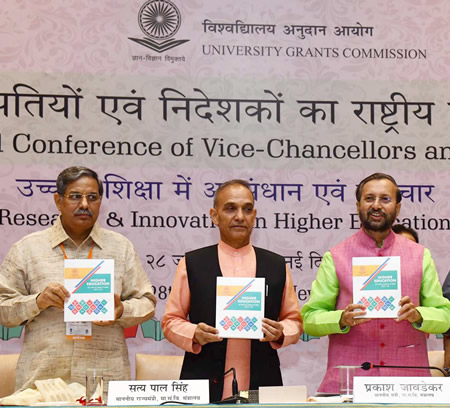
Photo: The Chairman, University Grants Commission of India (UGC), Prof. D. P. Singh; Minister of State for Human Resource Development, Dr. Satya Pal Singh; and the Union Minister for Human Resource Development, Prakash Javadekar, releasing the Higher Educational Profile 2017-18, at the National Conference of Vice-Chancellors and Directors, in New Delhi on July 27, 2018. [File Photo]
New Delhi, October 10, 2018 — India’s University Grants Commission (UGC) is cracking the whip on universities by issuing stern directions on how they should treat the Admission Seekers. This was disclosed by the Minister for Human Resource Development, Prakash Javadekar, at a press conference in New Delhi today. The University Grants Commission (UGC) would issue a Notification on refund of fees and non-retention of original certificates by Higher Education Institutions to facilitate students in their admission.
The University Grants Commission Notification on Refund of Fees and Non-Retention of Original Certificates is being brought out for the facilitation of the students. Now no student will be required to submit an original academic and personal certificates at the time of submission of admission form and Students’ will get the refund of fee from the Institution if they withdraw their admission from the programme. This notification shall apply to Under Graduate, Post Graduate and Research Programmes run by Universities included under Section 2(f) of the UGC Act, all Colleges under their affiliating domain and Institutions declared as Deemed to be Universities under Section 3 of the UGC Act.
Salient features of the Notification:
• The HEIs (Higher Education Institutions) can charge fees in advance only for the semester/ year in which a student wants to engage in academic activities. Collecting advance fees for the entire programme of study is strictly prohibited.
• The institute will be required to refund the fees, in case a student withdraws from the programme, in the following manner:
No student will be required to submit an original academic and personal certificates like mark sheets, and school leaving certificates at the time of submission of admission form. In case it is needed, the institution concerned will only ensure verification of the same with the original certificates and these shall be returned to the students immediately. No institution can take an original document into their custody.
• No HEI can make it mandatory for applicants to purchase the institutional prospectus at any time during the time of the study.
• To make an applicant choose an institution wisely, all HEIs will be required to disclose on their website and prospectus the following information:
• All HEIs will be mandatorily required to have a Grievance Redressal Mechanism (GRM), according to the provisions of the UGC (Grievance Redressal) Regulations, 2012. This GRM shall be available on the HEI website, and the HEIs will be required to ensure that all grievance received are addressed within 30 days.
• This notification provides for initiation of the following strict punitive actions by the Commission against defaulting HEIs:
Source: Ministry of Human Resource Development, Government of India.
|GlobalGiants.Com|
उचà¥à¤š शिकà¥à¤·à¤£ संसà¥à¤¥à¤¾à¤¨ अगर दाखिला वापस लेने वाले विदà¥à¤¯à¤¾à¤°à¥à¤¥à¤¿à¤¯à¥‹à¤‚ को उनकी फीस नहीं लौटाते हैं तो उनके खिलाफ सखà¥à¤¤ कारà¥à¤°à¤µà¤¾à¤ˆ होगी।
— Prakash Javadekar (@PrakashJavdekar) October 10, 2018
अब से किसी à¤à¥€ शिकà¥à¤·à¤£ संसà¥à¤¥à¤¾à¤¨ को विदà¥à¤¯à¤¾à¤°à¥à¤¥à¤¿à¤¯à¥‹à¤‚ के दसà¥à¤¤à¤¾à¤µà¥‡à¤œà¥‹à¤‚ की मूल पà¥à¤°à¤¤à¤¿ रखने का अधिकार नहीं होगा ।@ugc_india @AICTE_INDIA @PIBHindi #FEEREFUND pic.twitter.com/hE7iU5p0D2
Edited & Posted by the Editor | 4:24 PM | View the original post
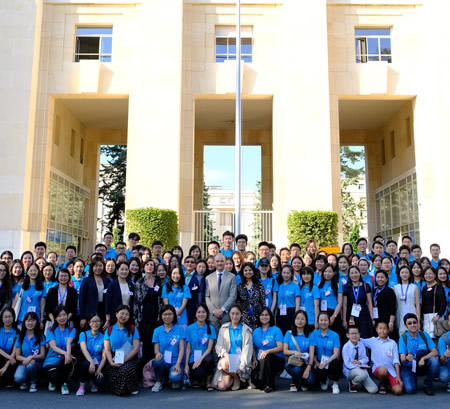
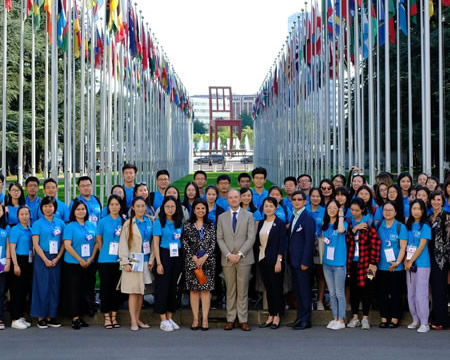
Photos: Students from Chinese university during the visit to UNCTAD. Group photo in front of the Place des Nations, at the UN’s European Headquarters in Geneva, Switzerland. August 16, 2018. Images provided by & Copyright © UNCTAD.
Geneva, 9 October 2018 - More than 5,000 participants from 160 countries will meet in Geneva to thrash out major new investment-for-development initiatives at UNCTAD’s World Investment Forum 2018 in the Palais des Nations, Geneva, Switzerland from 22-26 October.
The high-level conference comes amid mounting disquiet about declining investment flows and their impact on efforts to meet the ambition of the 2030 Agenda for Sustainable Development, adopted by the international community three years ago.
“Global flows of foreign direct investment fell by 23% in 2017,” United Nations Secretary-General Antonio Guterres said. “Cross-border investment in developed and transition economies dropped sharply, while growth was near zero in developing economies. With only a very modest recovery predicted for 2018, this negative trend is a long-term concern for policymakers worldwide, especially for developing countries.”
Private sector investment in developing countries, totaling $3.9 trillion a year, is needed to generate economic activity to meet the Sustainable Development Goals - the core of the 2030 Agenda -according to UNCTAD research. Current levels leave an investment gap of some $2.5 trillion.
Marking its 10th anniversary, the biennial World Investment Forum remains the premier venue to forge partnerships between investment and development stakeholders to close this gap.
A unique gathering of high-level players from the global investment-development community, the forum provides an opportunity to hold an open dialogue, brainstorm solution-oriented initiatives and foster global alliances to advance prosperity for all. This year’s event comprises some 60 functions, including three summits, five ministerial roundtables, private-sector led sessions and several awards ceremonies.
Besides giving participants a chance to spotlight priorities for attracting and channeling investment that will drive sustainable development, the forum sessions will also focus on transformative actions and innovative financing modes for growth, such as blockchain, sustainability bonds, and blended finance.
Speakers from business and special guests include more than 30 top executives of multinationals, among them Aviva, De Beers, Coca-Cola, ContourGlobal, Jumia, Lavazza, PwC, Siemens Financial Services, UBS, and the heads of stock exchanges including those in Bombay, Johannesburg, Luxembourg, Nasdaq Nordic, SIX and Shenzen, as well as the leaders of sovereign wealth and pension funds.
Fourteen heads of state and government have confirmed they will attend, including those from Armenia, Bangladesh, Botswana, Cambodia, the Central African Republic, Kenya, Lesotho, the Former Yugoslav Republic of Macedonia, Malawi, Mongolia, Montenegro, Namibia, Sierra Leone, and Switzerland.
More than fifty ministers from developed and developing countries and 21 heads of international organizations will join them.
In addition to United Nations entities, 50 other organizations will be at the event, including the Commonwealth, the International Labour Organization, the Inter-Parliamentary Union, the International Olympic Committee, the International Organization of Securities Commissions, the International Telecommunication Union, the Organisation for Economic Co-operation and Development, the World Economic Forum, the World Trade Organization and the World Bank Group.
These partnerships have generated exciting new content for this year’s participants, including an in-depth look at the relationship between sport and development, co-hosted with the International Olympic Committee and, on the annual United Nations Day, 24 October, a session on the role of investment in peace and security.
Five independent tracks will run in parallel with the main forum, with a special programme for parliamentarians, a multidisciplinary academic conference, an investment village, the 35th anniversary session of the Intergovernmental Working Group of Experts on International Standards of Accounting and Reporting (ISAR), and the 2018 UNCTAD Youth Forum, taking youth entrepreneurship as its theme.
Previous World Investment Forums took place in Accra, Ghana (2008), Xiamen, China (2010), Doha, Qatar (2012), Geneva, Switzerland (2014) and Nairobi, Kenya (2016).
Source: United Nations Conference on Trade and Development (UNCTAD), Geneva
|GlobalGiants.Com|
Trade Wars: When Elephants Fight. UNCTAD. https://t.co/d85QH2t3aM via @YouTube
— GlobalGiants.Com (@GlobalGiants) October 9, 2018
Edited & Posted by the Editor | 2:16 AM | View the original post
 |
 |
